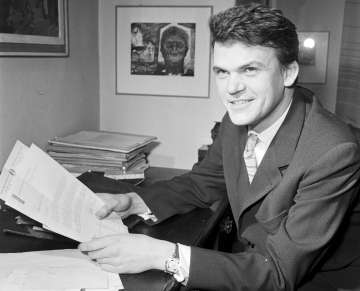Milan Kundera: 'The Unbearable Lightness of Being' author, dies in Paris aged at 94
"The Unbearable Lightness of Being,’’ Kundera’s best-known novel, opens wrenchingly with Soviet tanks rolling through Prague, the Czech capital that was the author’s home until he moved to France in 1975.

Milan Kundera, whose dissident writings in communist Czechoslovakia transformed him into an exiled satirist of totalitarianism, has died in Paris. He was 94. The renowned author died Tuesday afternoon, his long-standing publishing house Gallimard said in a one-sentence statement on Wednesday. It confirmed that he died in Paris but provided no further information. The European Parliament held a moment of silence upon news of his passing.
"The Unbearable Lightness of Being,’’ Kundera’s best-known novel, opens wrenchingly with Soviet tanks rolling through Prague, the Czech capital that was the author’s home until he moved to France in 1975.
Weaving together themes of love and exile, politics and the deeply personal, Kundera’s novel won critical acclaim, earning him a wide readership among Westerners who embraced both his anti-Soviet subversion and the eroticism threaded through many of his works. “If someone had told me as a boy: One day you will see your nation vanish from the world, I would have considered it nonsense, something I couldn’t possibly imagine. A man knows he is mortal, but he takes it for granted that his nation possesses a kind of eternal life,” he told the author Philip Roth in a New York Times interview in 1980, the year before he became a naturalized French citizen.
Who was Milan Kundera?
In 1989, the Velvet Revolution pushed Communists from power and Kundera’s nation was reborn as the Czech Republic, but by then he had made a new life — and a complete identity — in his apartment on Paris’ Left Bank.
“Milan Kundera was a writer who was able to reach generations of readers across all continents with his work and achieved world fame ...” Czech Prime Minister Petr Fiala tweeted in the Czech language. “He left behind not only a remarkable work of fiction but also an important work of essays.”
He offered condolences to Kundera’s wife Věra, who guarded her reclusive husband from the intrusions of the world. It was not immediately clear whether his wife was at his side. To say his relationship with the land of his birth was complex would be an understatement. He returned to the Czech Republic rarely and incognito, even after the fall of the Iron Curtain. His final works, written in French, were never translated into Czech. "The Unbearable Lightness of Being,’’ which won him such acclaim and was made into a film in 1988, was not published in the Czech Republic until 2006, 17 years after the Velvet Revolution, although it was available in Czech since 1985 from a compatriot who founded a publishing house in exile in Canada. It topped the best-seller list for weeks and, the following year, Kundera won the State Award for Literature for it.
Kundera refused to appear on camera, rejected any annotation
Kundera refused to appear on camera, rejected any annotation when his complete published works were released in 2011, and, earlier, would not allow any digital copies of his writing, reflecting his loyalty to the printed word. Today, however, a Kindle version of “The Unbearable Lightness of Being” is offered on Amazon and Google Books.
In a June 2012 speech to the French National Library — which was re-read on French radio by a friend — he said he feared for the future of literature.
“It seems to me that time, which continues its march pitilessly, is beginning to endanger books. It’s because of this anguish that, for several years now, I have in all my contracts a clause stipulating that they must be published only in the traditional form of a book, that they are read-only on paper and not on a screen,” he said. “People walk in the street, they no longer have contact with those around them, they don’t even see the homes they pass, they have wires hanging from their ears. They gesticulate, they should, they look at no one and no one looks at them. I ask myself, do they even read books anymore? It’s possible, but for how much longer?”
Kundera donated his private library
In 2021, Kundera decided to donate his private library and archive to the public library in Brno, where he was born and spent his childhood. The Moravian Library holds a vast collection of Kundera’s works. Donated items include editions of Kundera’s books in Czech and some 40 other languages, articles written by and about him, published reviews and criticism of his work, newspaper clippings, authorized photographs and even drawings by the author.
In recent years, Kundera allowed the translation of his late works from French into Czech. Despite the fierce protection of his private life — he gave only a handful of interviews and kept his biographical information to a bare minimum — Kundera was forced to revisit his past in 2008, when the Czech Republic’s Institute for the Study of Totalitarian Regimes produced documentation indicating that in 1950, as a 21-year-old student, Kundera told police about someone in his dormitory. The man was ultimately convicted of espionage and sentenced to hard labour for 22 years.
(With inputs from AP)
Also Read: Sita Dahal, wife of Nepal PM Pushpa Kamal Dahal 'Prachanda', passes away